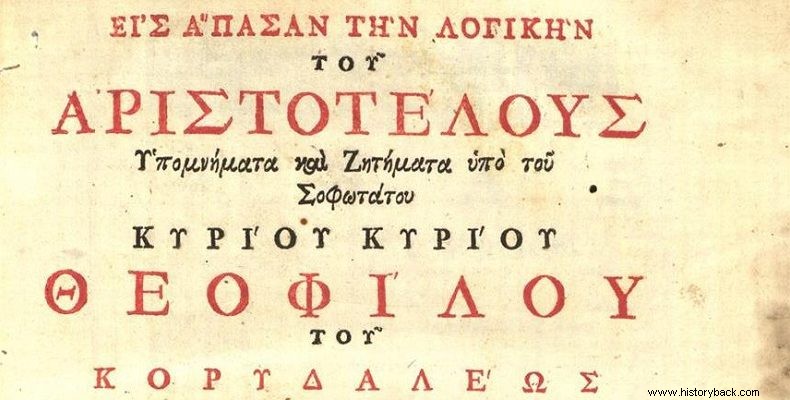
Theophilos Korydalleus was a great figure in the period of dark slavery and a great Aristotelian philosopher. He was born in Athens around 1563. His name was Theophilos Skordalos. He was named Korydalleus, after the homonymous peak of Mount Aegaleos.
He was educated in Rome and then studied medicine and philosophy at the famous University of Padua. At the end of his studies, he was named professor of the Greek school in Venice, in the period 1609-14.
In 1615 he returned to Athens and taught astronomy and philosophy . However, disappointed by the situation in Athens, he accepted the proposal of his old student Nikodimos Metaxas and moved to Zakynthos in 1620, where he taught philosophy and practiced medicine.
Between the years 1622-1624 he became a monk, ordained a priest and was named exarch of the Ecumenical Patriarchate. However, Theophilos, a free spirit, developed relations with the also great, learned patriarch Kyrillos Lukari, who, in 1624, named him head of the Patriarchal Academy of Constantinople. He remained in this position until his ordination as metropolitan of Nafpaktos and Artis, in 1640, from where he was expelled in 1641.
As a schoolmaster, Theophilos was faced with the conservative circles of the time who criticized his liberal spirit and their contacts with the Protestants. But mainly his opponents were bothered by his relationship with the enlightened patriarch Kyrillos Lukari.
A peculiar personality himself, he never tried to soften the reactions against him. However, he was a great scholar. Evgenios Voulgaris characterized him as a bright star of philosophy. After all, his work had a great impact and had a catalytic effect on the education of enslaved Christians.
Persecuted by the metropolis of Nafpaktos and Artis, Theophilos returned to Athens, where he spent his last years, until 1646 when he died, teaching and practicing medicine, constantly facing problems, due to his ideas and his character.
The philosophical method of Korydalleas, which was called "Korydallism", formed the basis of Hellenistic education during the Turkish rule, but during its last period, in the years of Enlightenment, the term "Korydallism" was identified with scholasticism and was criticized by exponents of modern intellectual and pedagogical trends. Thanks to Korydalleas, however, the foundations were also laid in the East for the emancipation of philosophy from theology by shifting the emphasis towards logic.
Korydalleus was a severe critic of medieval scholasticism and in religious matters he seems to have been rather a free thinker. Korydalleus was a follower of right reason and for this reason he was characterized as the first revolutionary thinker in the Greek East and as the proponent of free thinking in Southeast Europe.
The model of higher education he introduced there was imitated in the creation of new academic institutions in Iași and Bucharest, Trebizond, Patmos, Chios and elsewhere. His students in Constantinople inaugurated a tradition of Greek neo-Aristotelianism, which, through these schools, was transmitted from generation to generation until the end of the eighteenth century.
